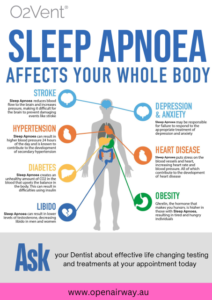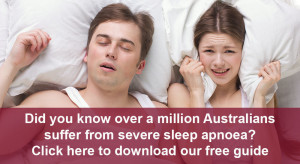Snoring & Sleep Apnoea
Are you consistently feeling exhausted? Or is your partner a persistent snorer?
Around 40% of the population are snorers. Some snore regularly and some only after a few drinks, a heavy meal or if very tired and some others only while lying on the back. Snoring can not only affect intimate relationships and embarrass people who travel or visit friends but also indicate a potentially far more sinister and potentially life-threatening problem called Obstructive Sleep Apnoea or OSA.
What is OSA and how do you know you have it?
Obstructive sleep apnoea is a breathing disorder that happens for some while they sleep. Often linked with snoring and other symptoms, sleep apnoea is caused by the airways collapsing throughout the night. The tongue falls back across the pharynx (the rear part of the mouth down to the voice box and throat area) during sleep when the muscles of the throat and tongue relax causing a partial or total blockage of the airway and breathing. This causes temporary pauses of breathing and results in less oxygen reaching the brain (and rest of the body).
There are, in fact, a number of areas where collapse of the airway can occur. Not only can the tongue drop back onto the back of the throat but also onto the soft palate and uvula, thus blocking the airway. The soft palate may become elongated and drape deeply behind the tongue and/or lose its muscular tone thus lying back against the back of the oro-pharynx just as the tongue does. The side-walls of the pharynx may collapse in toward the centre of the airway causing temporary blockage on breathing out. In the hypo pharynx, the epiglottis may collapse over the throat.
These pauses can range from 10 seconds to over a minute and may occur hundreds of times in one single evening. Because of the lack of oxygen to the brain, it forces you to wake and breathe (although you may not realise you’ve woken up). Because you have had an inconsistent rest and interrupted sleeping patterns, during the hours of the day you’ll likely feel sleepy and even agitated.
Did you know?
Sleep apnoea affects your whole body: stroke, hypertension, diabetes, libido, depression, anxiety, heart disease, and obesity.
Sleep Apnoea in Children
Sleep apnoea is diagnosed in children by visiting Dr Gibbins at Future Dental, or your GP, as they will evaluate the child’s symptoms and decide where to progress. You may be recommended to undergo a home sleep study. You can also undergo a BEARS screening test by clicking here!
Left untreated, obstructive sleep apnoea can also lead to a range of other harmful conditions such as:
- Increased risk of heart attack and stroke
- Hypertension
- Diabetes
- Dementia and Alzheimer’s disease
- OSA is a very common cause of single vehicle fatal accidents when the driver falls asleep behind the wheel. It also results in an increase in industrial and work-related accidents and poor decision making and inaccurate work. It is frequently accompanied by an increase in resting blood pressure with all those associated health risks as well.
- Clinical depression
There is a very high association between OSA and gastric reflux (GORD or GERD) and bruxism (grinding and clenching teeth) and clinical depression.
- 96% of people who have GORD and Bruxism also have OSA
- 70% of people with depression also have OSA
- 28% of the population over 50 have OSA
- It is more prevalent in males
- Obesity, morbid obesity and metabolic syndrome are high-risk factors for OSA
- Poly-cystic ovary syndrome (PCOS) is often associated with OSA
OSA and diabetes, are the two sleeping giants of medicine and, increasingly, your dentist is the first to pick up on it.
How can your dentist help you?
Future Dental has been working with patients suffering from OSA for decades. Since 1980, we have constructed a wide range of appliances to help our patients. Because of our experience in this field, we have determined that one particular type stands out from the rest as a comfortable reliable appliance – the Mandibular Advancement Splints (MAS).
While a CPAP machine is still regarded as the gold standard of treatment for OSA, up to 60% of users are not compliant with this treatment due to social, psychological, comfort and convenience factors. With increasing frequency, MAS is being recognised as an excellent substitute treatment.
While MAS’s still mean having to wear an appliance in the mouth, it is far less inconvenient than CPAP. Recent studies also indicate that a well-made MAS of the right type fitted by a practitioner is just as efficient in treating OSA as CPAP.
After Future Dental has assessed your risk factors and determined the best MAS appliance for you, we will digitally scan your jaws (rather than using impressions) all done in a 30-minute visit. We get the MAS back in about 3 to 4 weeks, at which point you will require a further 30-minute appointment to fit them and run through maintenance and adjustments. We will advise a review appointment one month later to ensure you are getting the best out of your MAS.
The appliance we make most commonly is made in Australia by Open Airway Dental Solutions, the company that took over from Oventus Medical, with Dr Chris Hart as the inventor.
While Dr Gibbins has made a number of different brands or types of Snoring appliances over the last 40 years or so, now he concentrates on only 2 brands but predominantly 1.

Click here to get your online Sleep Assessment at Dental Sleep Med today.
Discover how your nasal health impacts your sleep with our Nose Score in the Snoring & OSA Assessment. Click here to take the assessment today to learn more!
While Somnomed appliances are good for snoring and mild sleep apnoea, the same results are achievable by any of the various Oventus appliances which include
Oventus Mono, Oventus 2 Vent T (titratable), Oventus O2 Vent W (winged), Oventus TRD ( tongue retaining device) and now with the latest and probably best addition, The Oventus Optima Device. The Oventus range of appliances are unique in the world of sleep appliances in that each type incorporates an in-built airway that by-passes large tongues, low draping flaccid soft palates and, even better, works equally well if the nose is partly or fully obstructed. This additional benefit from all Oventus appliances gives them significantly higher effectiveness in being able to treat even moderate and severe obstructive sleep apnoea.
The ability of Oventus appliances to work equally well in people with nasal obstruction is a unique advantage of Oventus Appliances as all other types and brands of sleep appliances and also CPAP have far less efficacy in anyone who is a mouth breather because of nasal obstruction.
OSA Questionnaire
- Does anyone complain that you snore?
- Has anyone told you that you stop breathing while asleep sometimes?
- Have you ever woken up struggling for breath or gasping for air?
- Have you ever woken up feeling your heart racing?
- Do you feel excessively sleepy or drowsy during the day?
- Have you put on weight which you have found hard to lose again?
- Do you have blood pressure concerns or are you receiving treatment for it?
- Do your legs jerk or kick during sleep?
- Do your legs become restless while attempting to get to sleep, or during the day?
- Do you have trouble getting to sleep?
- Do you have trouble staying asleep, or do you wake up in the middle of the night and just lie there trying to get back to sleep?
- Do you feel unusual sensations in your legs during the day?
- Do you ever wake up with headaches?
- Do you ever get heartburn during the night, or while lying down?
- Do you need to get up during the night to pass urine?
Epworth Sleepiness Scale
Epworth Sleepiness Scale
How likely are you to doze off or fall asleep during the day in the following situations, in contrast to feeling just tired? Even if you have not done these things recently, try to work out how they would have affected you.
Use the following scale to choose the most appropriate number for each situation.
- 0 = would never doze
- 1 = Slight chance of dozing
- 2 = moderate chance of dozing
- 3 = high chance of dozing
SITUATION
- Sitting reading __
- Watching T.V. __
- Sitting inactive in public (e.g. Theatre, meeting) __
- As a passenger in a car for an hour without a break __
- Lying down to rest in the afternoon when able __
- Sitting and talking to someone __
- Sitting quietly after lunch without alcohol __
- In a car, while stopped for a few minutes in traffic __
Score____
EPWORTH SCORING
<8 Indicated normal sleep function
8-10 Indicates mild sleepiness
11-15 Indicates moderate sleepiness
16-20 Indicates severe sleepiness
21-24 Indicates excessive sleepiness
Bed-Partners Questionnaire
As most people may have trouble answering many of these questions, we find that asking the bed partner the questions often helps to get the most accurate answer to the above.
PLEASE ANSWER THE FOLLOWING QUESTION AS FOLLOWS:
QUESTIONS:
- Does your partner snore loudly?
- Does your partner snore in all positions?
- How often are you kept awake by snoring?
- How often are you forced to sleep in another room?
SCORE:
- For never
- For rarely
- For sometimes
- For often
- For always
What is Obstructive Sleep Apnoea?
Obstructive sleep apnoea (OSA) is a chronic sleep-related breathing disorder. It is characterised by frequent disruptions in the flow of air while sleeping, leading to brief periods of not breathing and an absence of oxygen. Addressing the problem early enough can prevent OSA from having adverse effects on your health and quality of life.
OSA occurs when the upper airway is completely or partially blocked during sleep. It is one of the most common sleep disorders, with about two out of three adults having signs of it. As a result, it is estimated that 25% of the population has moderate to severe OSA. OSA is a risk factor for various other diseases, including diabetes, cardiovascular disease, hypertension, osteoporosis, and impotence. It can also affect the quality of life of those affected, being associated with high blood pressure, high cholesterol, headaches, poor work and school performance, and automobile and workplace accidents. The total healthcare cost associated with OSA is estimated to be billions of dollars.
OSA affects people of both genders and all ages, but it is more common and severe in men than in women. OSA is more likely to occur in people who are obese, who have diabetes, who have had a stroke or heart attack, or who have a neuromuscular disease. OSA can occur in both children and adults. Adults are more likely to have sleep apnoea because their airways become narrower as we age, which is referred to as “airway remodelling.” In addition, obesity, smoking, diabetes, high blood pressure, and certain types of neurologic disorders (e.g., multiple sclerosis, Parkinson’s disease, and stroke) are risk factors for sleep apnoea.
What are the symptoms of Sleep Apnoea?
The signs and symptoms are highly variable and depend on the severity of the disease. They may also vary according to the time of night. Mild symptoms can include snoring, which may occur because of some other conditions as well, such as allergies or gastroesophageal reflux disease (GERD). More severe symptoms include insomnia and waking up with a dry mouth, feeling tired during the day, decreased performance at work, and problems with memory and attention span. High blood pressure, headaches, and depression may also be present in more severe cases.
How do I know if I have sleep apnoea?
If you have sleep apnoea, you may feel fatigued during the day, have problems concentrating, and experience headaches. Sleep apnoea sufferers may also experience excessive sweating, high blood pressure, and high cholesterol. If you have sleep apnoea, you may also notice that your partner snores loudly or that someone who shares your bed has complained of being kept awake by your snoring. If you have sleep apnoea, you may experience these symptoms:
- Feelings of fatigue during the day
- Problems concentrating
- Loud snoring at night
- Awaking with a dry mouth and sore throat
- Waking up with a headache
How is sleep apnoea diagnosed?
To diagnose sleep apnoea, Future Dental may review your medical history and perform a physical examination to rule out other causes of sleep disturbances. We may also recommend a sleep study, which is an overnight test that measures the quality of your sleep. A sleep study is the most effective way to diagnose sleep apnoea. This test can also show whether you have other sleep disorders, such as insomnia, sleep-related breathing disorder, or sleep-related movement disorder. Furthermore, we may suggest that you undergo a sleep study if you have a history of obesity, are over the age of 40, snore loudly, or have other symptoms of sleep apnoea.
Is sleep apnoea dangerous?
While the exact causes of sleep apnoea are not fully understood, studies have shown that it can be dangerous for people’s health, which increases the risk of heart disease, diabetes, and other serious health conditions. Because of this, anyone who suspects they might be experiencing sleep apnoea should consult their doctor to get appropriate treatment and talk about potential lifestyle changes that can help to mitigate its effects.
Additional Resources
Visit Dental Sleep Medicine for a range of treatments for OSA and more information.
For more information on OSA and treatment options, visit AER Healthcare.
How Future Dental can help you
Snoring no longer needs to affect your relationships and you can look forward to a far healthier life if your OSA is treated correctly.




